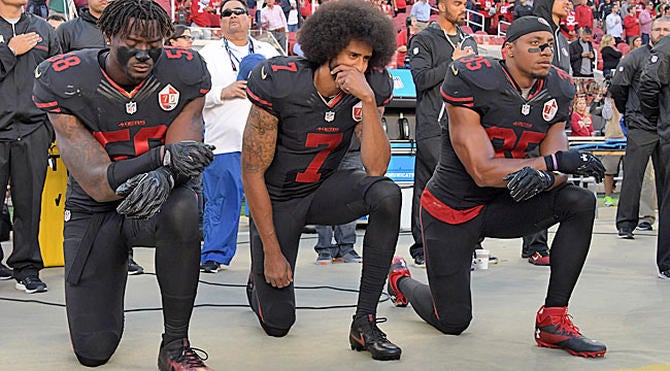
Tuesday was Jackie Robinson’s birthday. On this day, as on the April 15 anniversary of his first major-league game, we sports fans celebrate one of the greatest baseball players of all time, and one of the most revered heroes in American history.
The lens of perception tends to soften over time. Robinson might be universally loved today. But in 1947, he was widely reviled as an interloper trying to break through a wall of segregation. By threatening decades of white dominance, the mere act of Robinson playing in a baseball game became deeply political.
Seventy years later, we live in a more enlightened society. Yes, racism never left us, and never will. The good news is that it’s less overt today, making the notion of an athlete being banned from sports due to the color of his skin a distant memory.
Still, one constant remains. Then, as now, sports and politics remain intertwined. When someone says “stick to sports,” there’s an easy response: It’s impossible to keep politics out of sports, because sports have always been political.

There’s a perception that bringing up low pay for minor leaguers injects politics into an area where none should exist. But claiming that the status quo shouldn’t change is an inherently political act. If you believe that players should shut up and be thankful they’re making any money at all for playing a kid’s game, you are making a political statement about the role of labor, the role of management and how sports teams should be granted special status that no other industry gets to claim.
Stadium finance deals are political. Opponents of such deals argue that taxpayers shouldn’t be forced to foot the bill when billionaire owners want fancier places to host home games. They note that stadium deals don’t bring anywhere close to the economic benefit that owners claim. Funneling taxpayer money into these projects, they say, violates both the conservative principle of fiscal discipline and the liberal notion of spending money on projects that provide greater benefits to a greater number of people.
There’s a perception that bringing up taxpayer burdens for stadium deals injects politics into an area where none should exist. But claiming that the status quo shouldn’t change is an inherently political act. Making the argument that if Toyota can get government funding for a new plant, sports owners should get similar treatment for new stadiums, ignores the far greater economic boost derived from industries that offer more than a sprinkling of seasonal, part-time jobs. If you believe fans should be entitled to watch their home teams play a short drive away, even if it means that people other than the team owner must pay for it, you are making a political statement about the allocation of public resources, and how sports teams should be granted special status no other industry gets to claim.
Sports drafts are political. Opponents of drafts argue that forcing athletes to be subject to drafts instead of being free to shop their services to the highest bidder is a creative dodge set up by sports team owners to further enrich themselves. They note that pianists and dentists and tennis players are free to negotiate their pay without artificial barriers like drafts, so athletes who play in the world of team sports should get to do the same.
There’s a perception that bringing up the morality of drafts injects politics into an area where none should exist. Drafts are so ingrained in the psyche of sports fans that we turn draft days into national holidays. But claiming that the status quo shouldn’t change is an inherently political act. If you believe that drafts help sports leagues create parity and help sports teams prioritize how to acquire talent, you are again making a political statement about the role of labor, the role of management and how sports teams should be granted special status that no other industry gets to claim.
College sports are political. Opponents of the NCAA argue that funneling billions of dollars of revenue from college football bowl games and March Madness into the pockets of various administrators, while athletes collect zero dollars in salary, is immoral. When a college football coach is the highest-paid state employee in America, it looks even worse. Here too, people working in any other field are free to negotiate their pay, so athletes vying for national championships should also get to share in their industry’s windfall.
There’s a perception that bringing up the morality of college athletes being unpaid injects politics into an area where none should exist. College sports are a point of pride for tens of millions of alums, and anything that threatens the enjoyment of Saturday gameday or a David vs. Goliath matchup in the Sweet 16 risks scuttling one of the great pleasures we all get to enjoy. Besides, those ungrateful players get scholarship money and student housing and free equipment, so what right do they have to complain? But claiming that the status quo shouldn’t change is an inherently political act. If you believe schools should still reap the windfall, even as most so-called student-athletes get left behind by schools that don’t care about their education and a dog-eat-dog system in which they fail to go pro and fail to gain the proper skills they need to thrive in the real world, you are making a political statement about the fungibility of these young people’s lives, and how the NCAA should be granted special status that no other industry gets to claim.
Playing the national anthem before sporting events is political. Opponents of the practice argue that patriotism shouldn’t be forced on any of us. They further posit that “The Star-Spangled Banner” in its original form was a celebration of slavery. If an athlete, for any reason, wants to protest the anthem, or the flag, or any item that supposedly denotes patriotism, he or she should be free to do so. The beauty of living in a free society is the right to free expression, regardless of the content of your specific views. (Opponents of military flyovers could argue that those nods to forced patriotism are even worse, since they’re expensive, and financed by taxpayer dollars.)

There’s a perception that protesting the anthem injects politics into an area where none should exist. Athletes like San Francisco 49ers quarterback Colin Kaepernick, we’re told, get paid millions to play a game that many others would be happy to play for less. But claiming that the status quo shouldn’t change is an inherently political act. If you believe that athletes shouldn’t clutter the ritual of Sunday football and the group mentality of team sports with an individual statement, you are making a political statement that athletes shouldn’t be afforded the same right to free expression that the rest of us get to enjoy.
All of which brings us to Tom Brady. Facing a throng of media this week before the Super Bowl in Houston, Brady was asked a variety of questions. The New England Patriots quarterback had kept a “Make America Great Again” hat prominently displayed in his locker for several weeks during the 2015 season. In light of his support for then-candidate, now-President Donald Trump, Brady was asked for his thoughts on recent events, including the President’s recent executive order banning travel to the U.S. for refugees from seven predominantly Muslim countries.
“What’s going on in the world?” Brady answered. “I haven’t paid much attention. I’m just a positive person.”

No athlete should be required to offer political analysis, of course, just as no other private citizen should be coerced into doing so. But Brady had previously made a clear political statement in his show of support for Trump. Trying to sweep aside political questions in light of that support, at a time when hundreds of millions of people in America and abroad are deeply conflicted on different sides, and federal agents are ignoring court orders, is itself a political statement. It’s telling the world that Brady’s privileged station in life affords him the luxury to ignore other people’s problems, and that he can express his political leanings whenever the mood strikes him. Brady’s silence is as much a political statement as Toronto Raptors guard Kyle Lowry calling the travel ban “bullshit.”
Sports have long been a great escape from the hardships of daily life and global misery. They’re fun to watch, and once you get between the lines, they do transcend politics. As a sports fan myself, I welcome that escape, and the majority of my work will continue to revolve around coverage of the teams, players and games that make us smile.
But sports can never exist entirely in a bubble that’s completely detached from the real world. In sports, as in society, there will be those who seek to protect the status quo at all costs, and others who believe in progress, even though progress is usually messy, uncomfortable and frightening.
The enduring lesson of Jackie Robinson is that trying to cling to the way things have always been done often puts you on the wrong side of history. Sticking to sports, and basking in our own privilege which allows us to tune out everything happening in the world, risks doing the same.
[Source:-CBSS]







